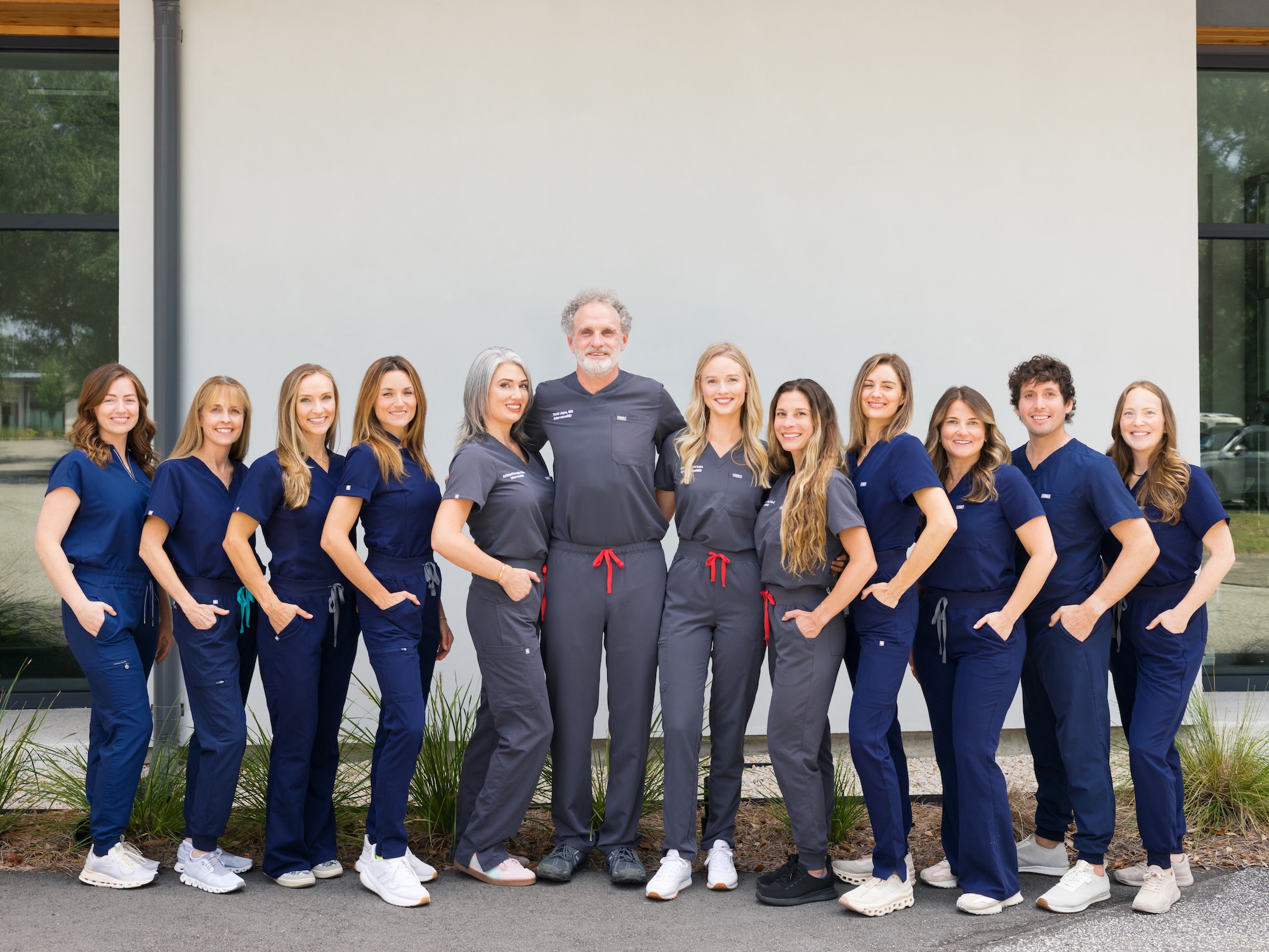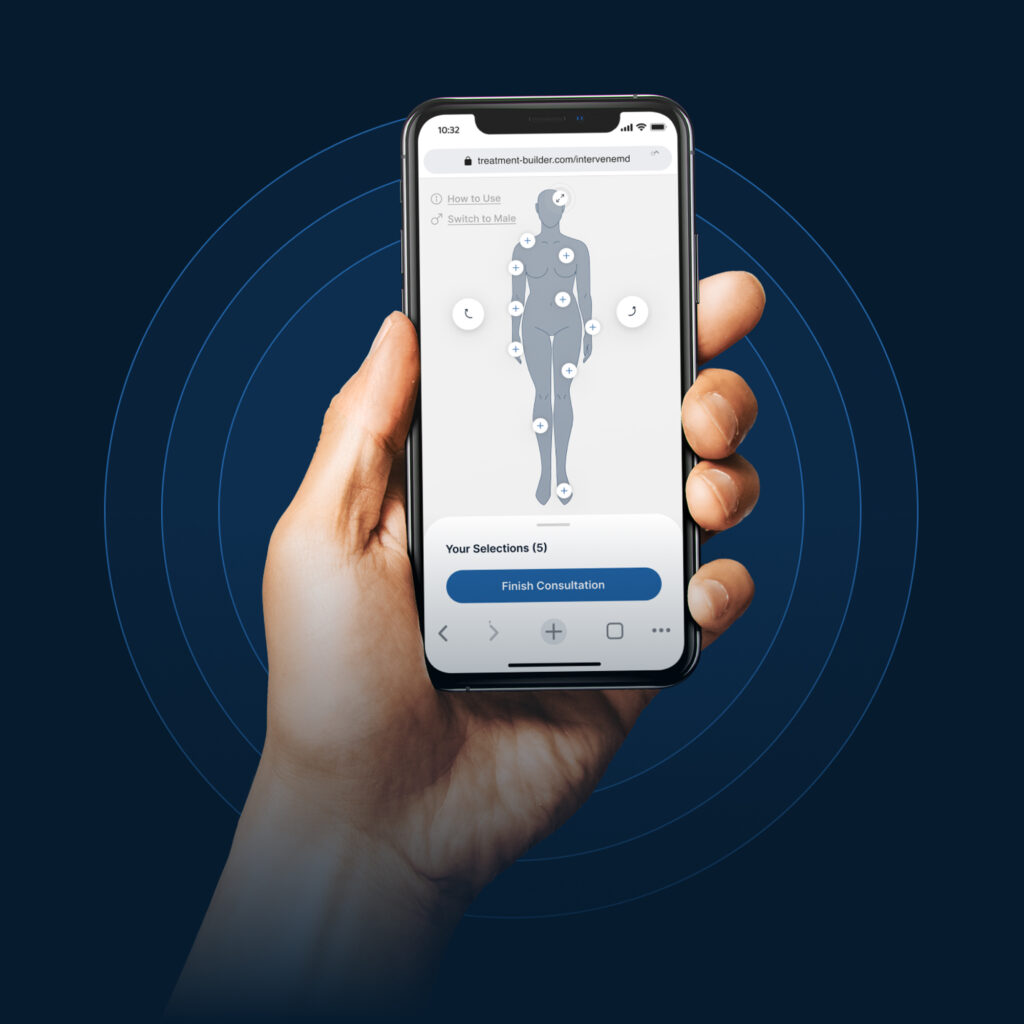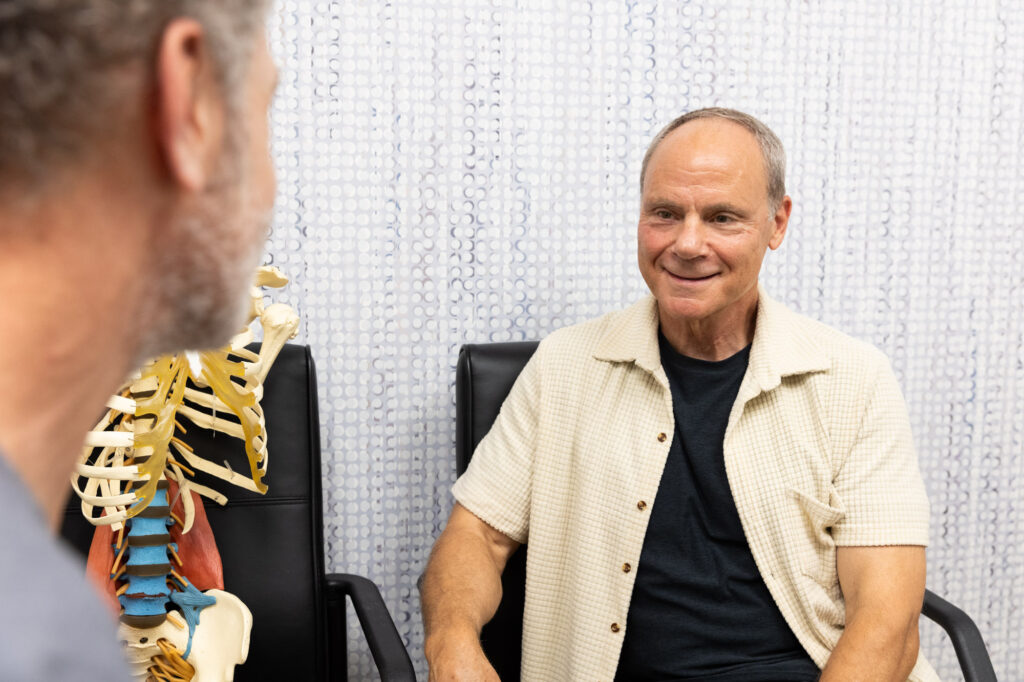
As men age, it’s natural for their testosterone levels to decline—but that doesn’t make the changes any less frustrating. From persistent fatigue and diminished sex drive to unwelcome mood shifts, the effects of low testosterone can interfere with the relationships and activities you enjoy most.
When these symptoms negatively affect your life, testosterone replacement therapy (TRT) in Mt. Pleasant, SC can restore your well-being and support your long-term health goals. At InterveneMD, we personalize our comprehensive TRT program to your unique needs, giving you the strength to feel like your best self.
Continue reading to learn why testosterone levels decrease over time and how our experienced team can guide you through the TRT process. If you’re ready to speak with one of our expert providers, give us a call or request an appointment online.
What is andropause?
Andropause marks a gradual decline in a male’s testosterone production. As the male reproductive hormone created and released in the testes, testosterone has a direct influence on energy levels, mental clarity, and libido.
This decrease in testosterone is closely related to the aging process, with levels falling about 1% a year starting around age 40. Often referred to as “male menopause,” andropause involves a variety of disruptive side effects, including:
- Low energy
- Mood changes
- Insomnia
- Enlarged breast tissue
- Erectile dysfunction
- Decreased libido
- Brain fog
Body composition changes can also point to low testosterone levels. As we get older, our muscle mass decreases naturally, often causing a loss of muscle definition and feelings of physical weakness. You may also experience increased body fat around the abdomen. Together, this can impact how men both look and feel in their own bodies, faced with less strength and confidence than they once had.
What other conditions cause low testosterone?
Not all testosterone deficiencies are age-related—men can experience a decline in testosterone as early as age 20. Several medical conditions and other factors can interfere with the body’s natural testosterone production, including:
- Testicular injury – Damage to the testicles, including blunt force trauma, ruptures, and testicular torsion.
- Anabolic steroid use – A steroid often misused to build lean muscle mass.
- Orchitis – Testicular inflammation caused by sexually transmitted diseases.
- Chemotherapy – Can harm or kill the cells in the testes responsible for testosterone production.
- Environment – Exposure to toxins, microplastics, hormones, pollution, pesticides, etc.
What is testosterone replacement therapy?
Testosterone replacement therapy (TRT) in Mt. Pleasant, SC helps patients replenish their hormone levels to their optimal balance. As a form of bioidentical hormone replacement therapy (BHRT), TRT exclusively focuses on restoring testosterone levels.
At InterveneMD, we can use lab work or the Dried Urine Test for Comprehensive Hormones (DUTCH) to perform a complete and thorough sex hormone analysis. The DUTCH test examines 35 different hormones to identify imbalances.
Once we receive your test results, we can customize your TRT dosage to address your unique deficiencies. We offer TRT in Mt. Pleasant, SC in the following forms:
- Patches
- Gels
- Creams
- Pills
- Injections
- Implanted pellets
You and your InterveneMD provider determine which TRT format best suits your personal preferences, including your lifestyle and routine, during your initial consultation.
How to Know if TRT is Right for You
We recommend TRT to men who are experiencing symptoms related to a testosterone imbalance, including low energy levels, erectile dysfunction, and decreased libido, and have confirmed low testosterone levels through your lab work or the DUTCH panel.
Though it may sound counterintuitive, TRT is just as vital for women in overcoming hormonal imbalances. Oral contraceptives, or birth control pills, can suppress testosterone production in the ovaries, impacting sexual function, energy levels, and mood. We recommend TRT to women looking for a safe and alternative treatment option for these symptoms.
Our experts do not recommend TRT to patients with a history of prostate or male breast cancer. TRT can stimulate the growth of hormone-sensitive cancers and increase your risk of recurrence.
Avoid TRT if you are attempting to conceive. Although it has positive effects on sexual function, TRT can negatively impact fertility and suppress sperm production. We recommend waiting until you are done having children to undergo TRT.
TRT Treatment Process
At InterveneMD, we understand the impact low testosterone levels can have on your physical, mental, and emotional health. We want to help you take on each day with strength, and for many patients, that confidence starts with TRT in Mt. Pleasant, SC.
Put your health first with help from our team of medical experts. Here’s a step-by-step overview of the TRT treatment process at InterveneMD.
Step 1: Schedule Your Consultation
To kick off your TRT plan, you first schedule a consultation with one of our expert providers.
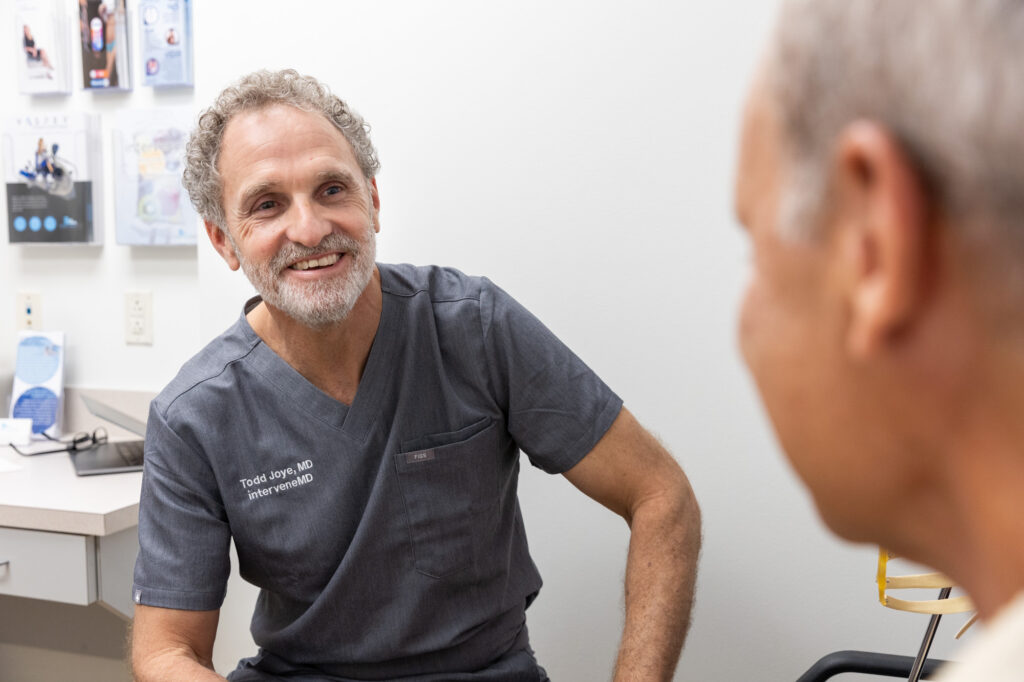
During your consultation, you will describe your symptoms and how they impact your daily function. Your provider will discuss your medical history and medications you take to help identify other conditions that may contribute to your concerns.
Step 2: Complete a DUTCH Test
Your provider will determine if further testing is needed before proceeding. If you could potentially benefit from TRT, we will perform a comprehensive blood panel to assess your hormone levels. This may be drawn here in office. Your provider may also send you home with a DUTCH panel, which requires 4 to 5 urine samples throughout a 24-hour period, including:
- Immediately after waking up
- 2 hours after waking up and eating breakfast
- Around dinner time
- Before bed
- In the middle of the night (optional if you typically wake up to urinate)
A member of our clinical team will be happy to meet with you to go through your DUTCH kit and your personal schedule with you to ensure all samples are collected accurately. This is very important for women in particular, as your levels will vary greatly depending on the phase of your menstrual cycle. We also recommend avoiding caffeine and alcohol in the days leading up to and days of your collections.
Once you’ve completed your DUTCH panel, use the prepaid shipping label to send your results to the lab as directed. These results are typically available within 4 weeks.
Step 3: Create Your Treatment Plan
After receiving your results, you will schedule an additional appointment with your provider to start creating your personalized treatment plan. Depending on your symptoms and the degree of testosterone deficiency reported in your hormone panel, your provider will determine the proper dosage to help relieve your symptoms. You will also discuss the best TRT administration method based on your needs and preferences.
We encourage you to use this opportunity to ask questions and voice any concerns you may have about the treatment process. Treat this appointment as an open conversation—after all, this is your TRT journey, and the decisions made regarding your care are meant to help you feel your best.
Step 4: Administer Your TRT
Guidelines for administering your TRT in Mt. Pleasant, SC will vary depending on your chosen method.
Implanted pellets require a short in-office procedure. At the time of the procedure, your provider will make a small incision in your hip or buttock before inserting a predetermined number of pellets and closing it with a suture.
Other forms of TRT can be self-administered from the comfort of your own home. These may be picked up at your local compounding pharmacy with a prescription.
Step 5: Attend Regular Check-Ins
After 2 to 4 weeks on TRT, you will schedule a follow-up appointment with your provider. This appointment allows them to analyze your progress and adjust your dosage if need be.
If your provider sees no further causes for concern, you will continue treatment with additional check-ins on a monthly basis. After a few successful months on TRT with zero disruptive symptoms, you’ll schedule the rest of your appointments every 3 to 6 months. You can schedule some of these less frequent check-ins over the phone.
Step 6: Restore Function
Most patients experience noticeable improvements in testosterone deficiency-related symptoms within a few weeks of starting treatment. The full benefits of TRT may take several months to develop, depending on your age, form of medication, and overall health.
Our experts recommend pairing your TRT treatment plan with healthy lifestyle habits to enhance your results. Following a nutritious diet and exercising regularly can help you maintain a healthy weight and increase the efficacy of your treatment. With optimal testosterone levels, you may find yourself feeling more energized, motivated to exercise, and engaged in your favorite activities.
Step 7: Enhance Your TRT Plan
For many patients, TRT in Mt. Pleasant, SC is only a small piece in the puzzle of creating their best self. Our experts can address a variety of health concerns to ensure you live up to your greatest potential each day.
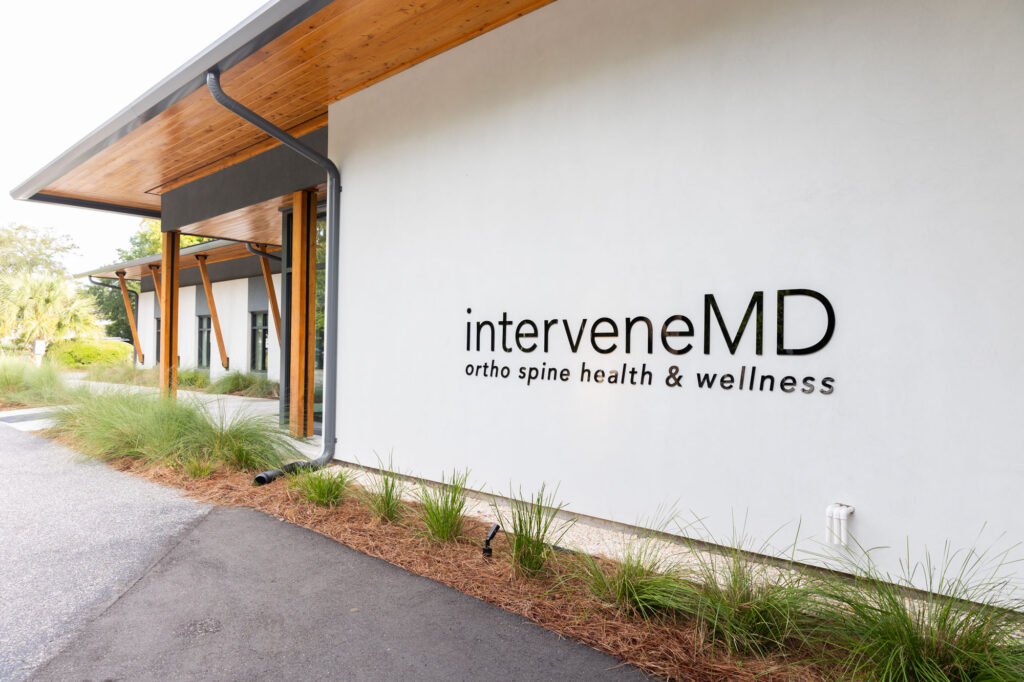
We recommend pairing your TRT plan with the following functional medicine treatments to address the symptoms related to low testosterone:
- IV infusion therapy – Delivers personalized vitamin, mineral, and antioxidant solutions intravenously for maximum absorption. Can help you combat fatigue and maintain superior hydration.
- Emsella – Uses non-invasive high-intensity focused electromagnetic (HIFEM) energy to stimulate the pelvic floor muscles. Helps many patients address erectile dysfunction.
- Weight loss injections – Suppresses appetite to help patients quiet “food noise” and make healthier decisions around mealtimes.
- Nutraceuticals – Targeted supplements that contain vitamins, minerals, fibers, probiotics, and herbs to address a variety of health concerns. Available in liquid, powder, capsule, or tablet form.
- Emsculpt NEO – Pairs radiofrequency (RF) energy with HIFEM to strengthen key muscle groups and reduce fat. Patients often use Emsculpt NEO to combat muscular atrophy and as a form of rehabilitative therapy to increase function.
- Peptides – Consists of chains of amino acids that support healing. Designed to work in harmony with the body’s natural processes to reduce brain fog, insomnia, signs of aging, and other concerns that may correlate with low testosterone.
The team at InterveneMD can help you determine which additional treatments can enhance your results during your initial consultation and regular check-in appointments.
Overcome Testosterone Deficiency at InterveneMD
Low testosterone can be detrimental to your health. Between brain fog that makes daily activities more difficult and a decrease in muscle mass that makes it hard to perform your best, testosterone deficiencies can impact nearly every aspect of your life.
Fortunately, Dr. Joye and our team of experts want to help you find effective solutions. With TRT in Mt. Pleasant, SC, lasting relief is finally within reach.
Give our team a call to schedule your consultation and learn what TRT can do for you.
Want to learn more about Intervene’s functional health philosophy? Head over to our blog for more information.

